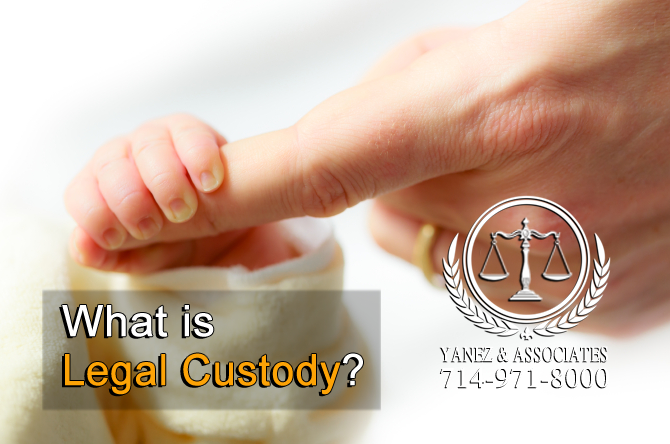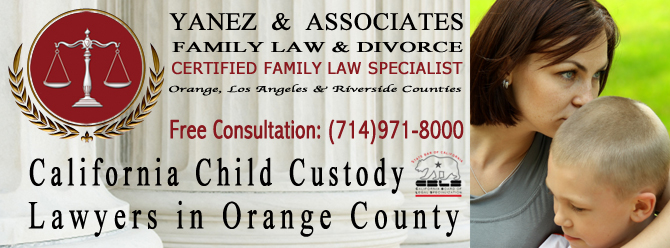What is the difference between Legal vs physical custody in Orange County California
Often times clients are confused over Legal vs physical custody in Orange County California. When a child custody agreement is created in California, it needs to include both kinds of custody - physical custody and legal custody. Each of these kinds of custody governs a different part of the child’s life, and each part is equally as important in ensuring that the child’s life is the best it can be.
What is Physical Custody?
Generally speaking, physical custody is the part of a custody order that determines where a child will spend his or her time. Some children with parents who live separately may have a bedroom in both homes and spend nearly equal time in both, some may live with one parent during the school year and spend summers with the other, and some may only see one parent on occasion. There are many different kinds of physical custody agreements that can be put into place depending on each unique child, the child’s unique needs, and the family situation.
A parent who has the right to physical custody of a child has the right to be with the child, or to have the child in their custody.
Physical custody can be granted either solely to one parent or jointly to both parents of a child.
Sole Physical Custody
When sole physical custody is granted to one parent, it means that the child will live with that parent, also called the custodial parent. Usually, the parent who is not granted custody in this situation will have the right to visitation with the child - but not always.
Why might sole physical custody be granted?
Usually, it is in the best interest of a child to spend time with both parents. Unless one parent is unable to properly provide and care for a child, it is likely that joint custody will be granted. However, in some cases, it is simply not possible for a child to spend nearly equal amounts of time with both parents.
Sole custody may be granted in the following situations, or when it is considered not to be in the child’s best interests in California.
• When spending time with one parent means that the child will be exposed to substance abuse;
• When spending time with one parent means that the child will be late for school, or that the child will not be supervised appropriately;
• If the child has little or no relationship with one parent, whether due to never having met, the parent’s job, or another reason;
• If the parents live far from one another and joint custody is not feasible;
• When one parent is incarcerated, deployed in the military, in the peace corps, or out of town for work, one parent may be able to provide a better environment for the child, and have sole custody;
• If domestic violence or child abuse have been an issue with either parent, the other parent may be granted sole custody; or
• There are various other reasons why a parent may be granted sole custody if it is in the best interest of the child.
What is visitation?
Remember that if sole custody is granted to one parent, it is still usually in the child’s best interest to spend time with the other parent as well. This is why visitation is sometimes granted to the noncustodial parent. There are several types of visitation that may be granted, depending on each unique situation.
Scheduled visitation is great for families where there might be an issue following a visitation order. It includes details about when and where visitation will take place and can be tailored to each family’s needs, from vacations and holidays to birthdays and special events. There is very little room to accidentally violate a scheduled visitation order.
Reasonable visitation is a little bit more relaxed; it may provide a general idea of how much time a child will spend with the visiting parent, but it does allow the parents to set up the details of when, where, and how the visitation will occur.
Scheduled visitation is used when the child has little or no relationship with the noncustodial parent, or when it is not necessarily in the child’s best interest to spend time with the noncustodial parent, but that parent has made some effort to show that he or she is working towards providing a safe and healthy environment for the child. When scheduled visitation is ordered, it means that the noncustodial parent will not spend time with the child unless another adult is present.
Joint Physical Custody
Physical custody can also be awarded jointly to both parents. This means that both parents have custody of the child for significant amounts of time. Time may not be split evenly between both parents (sometimes this is not possible), but the child’s time should be split close to equally between the two parents.
Visitation is not necessary when joint custody is awarded because both parents already spend large amounts of time with the child.
What is Legal Custody?

"Like physical custody, legal custody can be granted either solely to one parent or jointly to both parents. "
In California, legal custody refers to the person who is responsible for making decisions for the child’s life. The parent who is granted this right will make decisions regarding the following aspects of the child’s life.
• Health care, including both physical and mental health, doctors, dentists, therapy, etc.
• Religion,
• Education,
• Extracurricular activities,
• Welfare,
• Travel and vacations,
• Other decisions deemed important by the judge or based on the child in question.
Like physical custody, legal custody can be granted either solely to one parent or jointly to both parents. When legal custody is granted solely to one parent, it means that that parent is responsible for making all decisions in the child’s life - and the other parent has to abide by those decisions. If legal custody is granted jointly to both parents, then the parents need to work together to make decisions in the best interest of the child.
You can probably imagine that joint custody takes a certain kind of relationship between the parents in order to work properly. It is usually in the best interest of the child and the parents if joint custody is possible.
How is Custody Awarded?
Just because one type of custody is granted solely to one parent does not mean that the other kind will also be granted solely. One type may be granted solely while the other is granted jointly.
Ideally, in order to allow both parents to maintain their parental rights, and the child to spend time with both parents, both joint physical and joint legal custody would be granted. However, the best interest of the child is the legal standard to which all custody agreements are held, and both joint physical and joint legal custody does not always meet that standard, nor is it always possible.
For example, if one parent is in the military, he or she may not be able to be physically present as much as the other parent. In this situation, sole physical custody may be granted to one parent while the other parent is in the military or deployed. However, that parent may still be able to contact the other parent and make decisions about the child and his or her life, so joint legal custody may be both feasible and in the best interest of the child. A similar situation would occur if the parents were married and lived in the same household, except that there would be no court order.
No matter what, child custody orders are always intended to be created based on the child’s best interest.
You may opt to create your child custody agreement on your own outside of a courtroom, with the help of a professional such as a child custody attorney or a child custody mediator, or you may opt to handle it through a legal trial. Like custody agreements, the best method for creating a custody agreement is not always the same in every situation.
Always put the best interest of your child first - it is the most important aspect of a custody agreement.
California Child Custody Lawyers in Orange County
If you have questions about child custody, or if you are ready to create or modify a child custody order for your child, you should contact an attorney for assistance. Even if you don’t want to work through your custody agreement in court, a lawyer can help you to understand how custody law works in California, and make sure that you have all of your bases covered, including both physical and legal custody. Contact the attorneys at Yanez & Associates today to schedule your free initial consultation with a qualified custody lawyer in Orange County.















